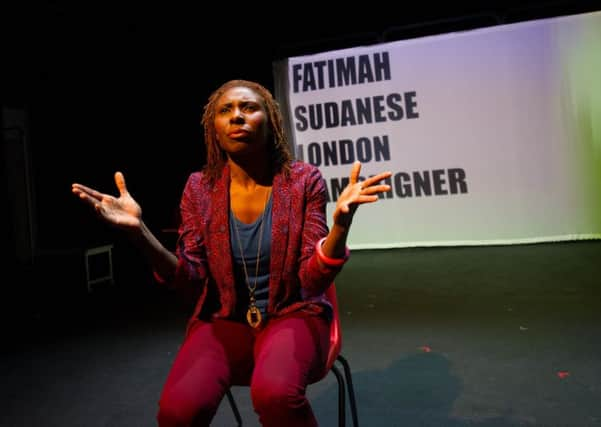Joyce McMillan: Fiction can tell truths too


Another night in the theatre, another company of actors sitting or standing in front of microphones, speaking the words of real people caught up in some battle for justice that demands a hearing. In the last six weeks, in Scottish theatre, there’s been the National Theatre of Scotland’s fine documentary show Rites, about women’s experience of female genital mutilation. There’s been Kai Fischer’s beautiful Last Dream (On Earth), partly based on real-life interviews with migrants who have made the traumatic Mediterranean crossing. There’s also been Alan Bissett’s solo show What The F**kirk, about the history and identity of the town right in the middle of Scotland’s central belt. And at the Citizens’, there was an unforgettable revival of Robert David MacDonald’s Into That Darkness, based on journalist Gitta Sereny’s meticulous reporting, from the 1970s, of her long, in-depth prison interviews with former Treblinka camp commandant Franz Stangl.
The idea of theatre as an arena for news and factual reporting is not new, of course. In the first half of the 20th century, radical theatre-makers from Berthold Brecht to Joan Littlewood combined theatre-making with “living newspaper” work; and in the 1970s, John McGrath’s 7:84 companies carried on that great tradition.
Advertisement
Hide AdYet towards the end of the last millennium, there was a measurable shift, in medium-scale British theatre, towards explicitly factual shows. Robert David MacDonald’s version of Into That Darkness dates from 1994, as does the first great verbatim play at the Tricycle Theatre in London, Richard Norton-Taylor and John McGrath’s Half The Picture, about British arms supplies to Iraq. In 1999, Norton-Taylor produced his most famous verbatim play, The Colour Of Justice, about the death of Stephen Lawrence. And within a decade, shows like Sherman Cymru’s Deep Cut, about the deaths of young soldiers at a British army training base, and David Hare’s The Permanent Way, about rail privatisation, were touring the country, winning awards, and clearly meeting a deep need in audiences for a closer and more consciously collective look at controversial contemporary issues.
So what does this continuing surge of verbatim and documentary theatre tell us, about the world we now inhabit, and the role of theatre in it? First, it suggests there is a growing gap between public needs and expectations and the information provided by more conventional news media, which theatre feels a certain pressure to fill; and in that sense, the growth of documentary theatre has to be seen as a strong and positive response to the need for a wider-ranging and better-informed public debate.
Secondly, though, there also seems to be a growing cultural preference for work that can demonstrate “authenticity” by showing a strong factual or documentary basis, as if that gave it an authority – and an entitlement to funding – to which mere fiction can no longer aspire; and if that view becomes more widespread, particularly among funding bodies, then it obviously diminishes the chance of new work in our theatres setting off on those flights of imagination that create our greatest dramatic stories.
Last weekend, for example, Dundee Rep and Perth Theatre launched their new production of Jo Clifford’s stage version of Great Expectations. And although that mighty novel was informed by Dickens’s vast factual knowledge of mid-19th century England – the pace of social change, the savage criminal justice system – I wonder whether we would remember it at all, now, if Dickens had not dreamed of and invented the characters of Pip and Estella, the convict Magwitch, the chilling Miss Havisham. In theatre, of course, there are no rules; sometimes documentary soars brilliantly into art. If we lose faith in fiction as a form of truth-telling, though, we lose something infinitely precious; and although, in a bureaucratic age, the appeal of the factual is often easier to articulate, I suspect it’s often still the bold leap of fictional imagination that brings us closest to some kind of truth.
• Great Expectations is at Dundee and Perth until 27 June; What The F**kirk is on tour until tomorrow